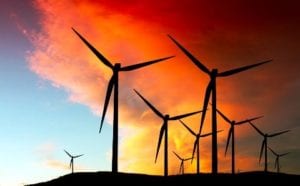Ghana’s first wind farm will provide in the region of 10% of the country’s electricity generation capacity upon its completion in 2016. The project, valued at US$525 million, is expected to reach financial close next year.
This follows the signing of an agreement between Mainstream Renewable Power and Swiss wind farm developer, NEK Umwelttechnik, to secure the 225 MW Ayitepa Wind Farm which is situated on the outskirts of Accra. Mainstream is to manage the construction, operational aspects and maintenance of the wind farm for its lifecycle. “It is my hope that this agreement between NEK and Mainstream will accelerate the process towards the realisation of wind farms in Ghana and they can be assured of the full support of the Ministry of Energy and Petroleum. The project is consistent with government policy to increase the contribution of renewable energy in the electricity generation mix,” comments Wisdom Ahiataku-Togobo, the director of Renewable Energy at Ghana’s Ministry of Energy and Petroleum.“The Renewable Energy Act 2011 provides the necessary legal and fiscal incentives including feed-in-tariff (sufficient security) to ensure return on investment by Independent Power Producers. The government has more than two years of bankable wind energy data along the south eastern corridor of the country where wind energy prospects are very encouraging,” he further explains.
Mainstream’s chief executive, Eddie O’Connor, states: “This wind farm is the ideal solution for Ghana because the country needs large quantities of electricity and it needs it fast. Wind and solar power are the only proven technologies in the world today which can achieve the dual objectives of speed of deployment and scale. No other generation technology can match that in terms of speed of delivery.” Christoph Kapp, NEK’s chief executive comments: “This project will not only contribute to a sustainable, clean and independent production of electricity, but will also be accompanied by a lot of social benefits and improvements for the local population such as labour, better education, water supply and electrification for nearby villages and towns.”






